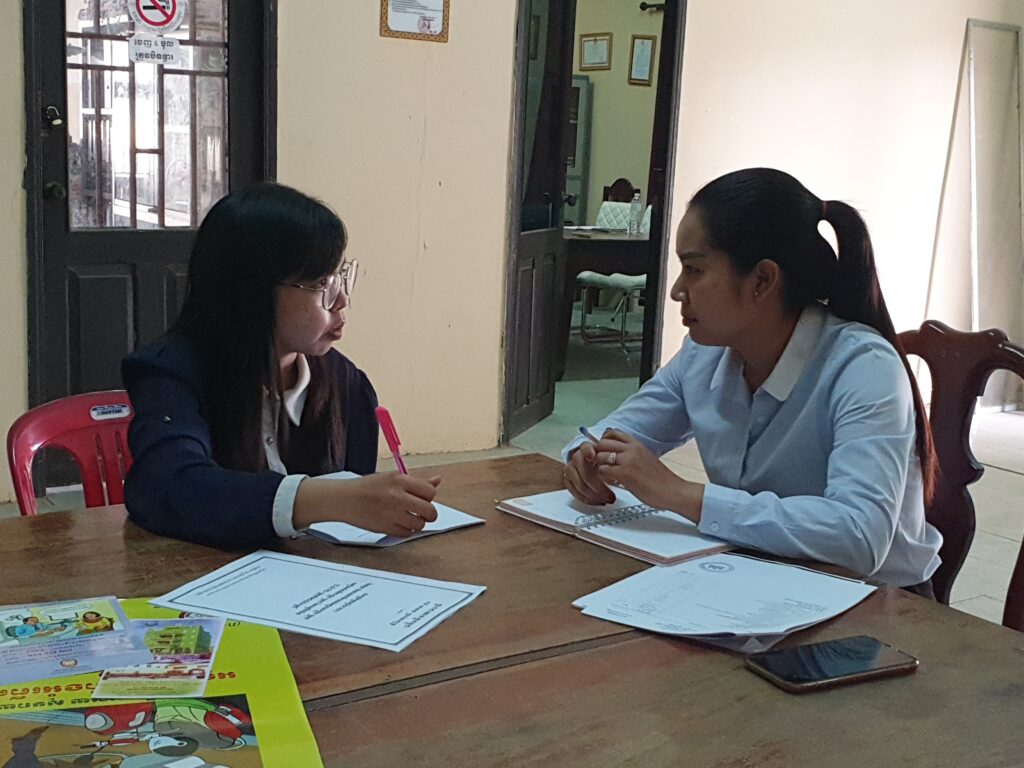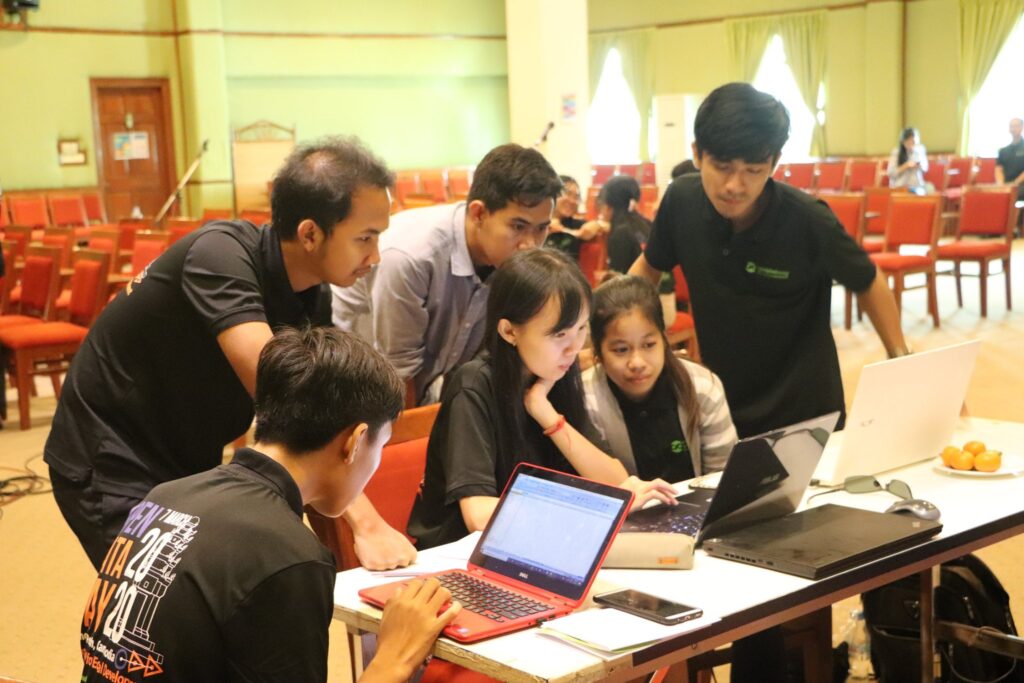ទិវាយុវជនពិភពលោក ឆ្នាំ២០២០
នៅក្រោមប្រធានបទ “ការចូលរួមរបស់យុវជនក្នុងសកម្មភាពសកល” ទិវាយុវជនពិភពលោក ឆ្នាំ២០២០ នេះ ផ្តោតទៅលើការចូលរួម និងតំណាងភាពរបស់យុវជនក្នុងកិច្ចការសាធារណៈនៅថ្នាក់កម្រិតក្នុងស្រុក និងពិភពលោក។ ទិវាយុវជនអន្តរជាតិ ត្រូវបានប្រារព្ធជារៀងរាល់ឆ្នាំចាប់តាំងពីឆ្នាំ១៩៩៩ នៅពេលដែលមហាសន្និបាតអង្គការសហប្រជាជាតិ បានយល់ព្រម និងទទួលស្គាល់ទៅលើអនុសាសន៍ដែលបានធ្វើឡើងដោយ សន្និសីទពិភពលោកនៃរដ្ឋមន្រ្តីទទួលបន្ទុកយុវជន (លីសបោនថ្ងៃទី៨-១២ ខែសីហា ឆ្នាំ១៩៩៨) ថាថ្ងៃទី ១២ ខែសីហា ត្រូវបានប្រកាសជាទិវាយុវជនអន្តរជាតិ។ ទិវាយុវជនអន្តរជាតិផ្តល់នូវឱកាស អបអរសាទរ និងលើកកម្ពស់ សំលេង សកម្មភាព និងគំនិតផ្តួចផ្តើមរបស់យុវជន។
ទោះបីតម្លាភាពថវិកាប្រហែលជាមិនមែនជាប្រធានបទដ៏ទាក់ទាញ សម្រាប់គ្រប់គ្នាក៏ដោយ វាកំពុងក្លាយជាការចាប់អារម្មណ៍កាន់តែខ្លាំងឡើងនៅក្នុងព្រះរាជាណាចក្រកម្ពុជា និងនៅជុំវិញពិភពលោក។ មិនថាការពិភាក្សាជាមួយមន្រ្តីមូលដ្ឋាន ជាមួយមិត្តភក្តិ ឬគ្រាន់តែទទួលបានការជូនដំណឹងអំពីរបៀបដែលប្រទេសមួយប្រើប្រាស់ថវិការរបស់ខ្លួន ការចំណាយថវិការដ្ឋបាលមូលដ្ឋានមានផលប៉ះពាល់ផ្ទាល់ដល់ការរស់នៅប្រចាំថ្ងៃរបស់យើង។ ដូច្នេះហើយទើប ថ្ងៃនេះគឺជាឱកាសមួយដើម្បីលើកទឹកចិត្តយុវជនឱ្យយល់ដឹង អំពីដំណើរការថវិកា ស្របពេលដែលយុវជនកម្ពុជាគាំទ្រតម្លាភាពគណនេយ្យភាព និងការឆ្លើយតបកាន់តែច្រើននៅក្នុងថវិកាសាធារណៈ។
ប្រទេសកម្ពុជាមានចំនួនយុវជនច្រើនជាងគេនៅអាស៊ីអាគ្នេយ៍។ ខុសពីបណ្តាប្រទេសអាស៊ីអាគ្នេយ៍ដទៃ ដែលអត្រាភាគរយនេះត្រូវបានគេរំពឹងថានឹងធ្លាក់ចុះនៅឆ្នាំ២០៣០ សមាមាត្រនៃយុវជនលើចំនួនប្រជាជនសរុបត្រូវបានគេរំពឹងថានឹងឡើងដល់កំពូលនៅឆ្នាំ ២០៣៥ ។ កំណើនប្រចាំឆ្នាំជាមធ្យមត្រូវបានគេរំពឹងថានឹងកើនឡើងពី ០,១% ក្នុងឆ្នាំ ២០០៥–២០១៥ រហូតដល់ ១,០% ក្នុងឆ្នាំ ២០២៥-២០៣៥ ។ ការកើនឡើងនៃប្រជាសាស្ត្រយុវជន ផ្តល់នូវតួនាទីដ៏សំខាន់ដល់យុវជន និងគូសបញ្ជាក់ពីសារៈសំខាន់នៃការពង្រឹងឱកាសសម្រាប់ពួកគេក្នុងការទទួលបានព័ត៌មាន និងការចូលរួមនៅក្នុងដំណើរការថវិកា។
យុវជនកម្ពុជាអាចរួមចំណែកយ៉ាងច្រើនក្នុងការរីកចម្រើន និងការអភិវឌ្ឍប្រទេសរបស់ពួកគេ។ ដោយមានគោលបំណងជួយពង្រឹងភាពច្បាស់លាស់ និងភាពមើលឃើញនៃថវិកាឃុំសង្កាត់ អង្គការទិន្នន័យអំពីការអភិវឌ្ឍ (អូឌីស៊ី) និងដៃគូរបស់ខ្លួនគឺ អង្គការស្តារកម្ពុជា នឹងអនុវត្តសកម្មភាពចំនួន ៣។ ក្រុមបណ្តាញសហគមន៍ និងអង្គការសង្គមស៊ីវិលនឹង៖
- ពិនិត្យលើថវិកាស្រុក ចាប់ពីការបែងចែកថវិកាជាតិ និងចំណូលដែលបានផលិតក្នុងស្រុក។
- ពិនិត្យមើលថាតើផែនការវិនិយោគនិងគម្រោងអភិវឌ្ឍន៍ឆ្លើយតបទៅនឹងតម្រូវការជាក់ស្តែងរបស់សហគមន៍យ៉ាងដូចម្តេច។
- តាមដានការចំណាយថវិការដ្ឋបាលមូលដ្ឋាន គាំទ្រតម្លាភាព និងគណនេយ្យភាពដោយលើកកម្ពស់អភិបាលកិច្ចល្អ និងប្រសិទ្ធភាពនៃការផ្តល់សេវាសាធារណៈ។
 យោងតាមការស្ទង់មតិរបស់យូអិនឌីភី យុវជនកម្ពុជាមានមោទនភាពជាជនជាតិខ្មែរ និងទិសដៅដែលប្រទេសកំពុងឈានទៅរក។ ពួកគេឱ្យតម្លៃទៅលើប្រវត្តិសាស្ត្រ មរតកវប្បធម៌ ប្រជាធិបតេយ្យ និងការដឹកនាំ ហើយភាគច្រើន (៨១% នៃអ្នកឆ្លើយសំណួរ) មានអារម្មណ៍ថាប្រជាជនកម្ពុជាទាំងអស់ត្រូវបានគេគោរពស្មើៗគ្នា។
យោងតាមការស្ទង់មតិរបស់យូអិនឌីភី យុវជនកម្ពុជាមានមោទនភាពជាជនជាតិខ្មែរ និងទិសដៅដែលប្រទេសកំពុងឈានទៅរក។ ពួកគេឱ្យតម្លៃទៅលើប្រវត្តិសាស្ត្រ មរតកវប្បធម៌ ប្រជាធិបតេយ្យ និងការដឹកនាំ ហើយភាគច្រើន (៨១% នៃអ្នកឆ្លើយសំណួរ) មានអារម្មណ៍ថាប្រជាជនកម្ពុជាទាំងអស់ត្រូវបានគេគោរពស្មើៗគ្នា។
ទោះយ៉ាងណា ភស្តុតាងថ្មីៗបង្ហាញពីការចូលរួមរបស់យុវជនតិចតួចនៅក្នុងសហគមន៍ និងកិច្ចការជាតិផ្សេងៗ ដោយមានអ្នកឆ្លើយសំណួរជាយុវជនត្រឹមតែ១ភាគ៤ ប៉ុណ្ណោះដែលធ្លាប់លឺពាក្យ “តម្លាភាព” និង ១០% ធ្លាប់លឺពាក្យ“ គណនេយ្យភាព” ។ ការយល់ដឹងអំពីពាក្យទាំងនេះគឺរឹតតែទាបជាងភាគរយខាងទៀត ក្នុងចំណោមអ្នកឆ្លើយសំណួរ។ ទោះបីជាមានការយល់ដឹងទាបអំពីពាក្យ “តម្លាភាព” ក៏ដោយ ក៏យុវជនចំនួន៣ភាគ៤ បានយល់ស្របនឹងគោលការណ៍តម្លាភាព។
ទោះបីជាពាក្យតម្លាភាពមិនត្រូវបានគេប្រើប្រាស់បានទូលំទូលាយនៅក្នុងការអនុវត្តក៏ដោយ គំនិតនៃតម្លាភាពត្រូវបានគេឱ្យតម្លៃខ្ពស់។ អ្នកឆ្លើយសំណួរភាគច្រើនបានយល់ស្របថាគួរតែមានតម្លាភាពទាក់ទងនឹងការចំណាយសាធារណៈ ហើយថាការតែងតាំងតួនាទីក្នុងវិស័យសាធារណៈគួរតែផ្អែកលើសម្ថភាព និងគុណសម្បតិ្ត។ ដូច្នេះសំណួរនៅត្រង់ចំណុចនេះគឺថា តើតួលេខថវិកានឹងផ្លាស់ប្តូរយ៉ាងដូចម្តេចប្រសិនបើយុវជនត្រូវបានគេជូនដំណឹងអំពីដំណើរការថវិកានិងចូលរួមក្នុងដំណើរការនេះ?
ឧបករណ៍អនឡាញ និងឧបករណ៍ឌីជីថល ត្រូវតែជាចំណុចសំខាន់នៃយុទ្ធសាស្ត្រណាមួយដែលមានបំណងផ្សព្វផ្សាយដល់យុវជនជំនាន់ក្រោយ ព្រោះការប្រើប្រាស់អ៊ីនធើណេត និងប្រព័ន្ធផ្សព្វផ្សាយសង្គមមានការកើនឡើងខ្ពស់។ កិច្ចខិតខំប្រឹងប្រែងក្នុងវិស័យព័ត៌មាន និងទំនាក់ទំនង ដែលបានកែច្នៃឱ្យត្រូវនឹងទម្លាប់នៃការប្រើប្រាស់ប្រព័ន្ធផ្សព្វផ្សាយរបស់យុវជន អាចនាំឱ្យមានការកើនឡើងនូវឱកាសចូលរួម នឹងពង្រឹងការគាំទ្រសម្រាប់ការសម្រេចចិត្តក្នុងវិស័យសាធារណៈ។
ជាមួយនឹងបទពិសោធន៍យ៉ាងច្រើនក្នុងការអភិវឌ្ឍគេហទំព័រ និងការគ្រប់គ្រងទំព័រហ្វេសប៊ុក ក្រុមការងារអូឌីស៊ី នឹងគាំទ្ររដ្ឋបាលស្រុកដើម្បីបង្កើត និងរចនាគេហទំព័ររបស់ពួកគេ។ ការធ្វើបែបនេះនឹងជួយឱ្យយុវជនអាចទទួលបាននូវបច្ចុប្បន្នភាពអំពីវិធីដែលថវិកាត្រូវបានបែងចែក និងប្រើប្រាស់ ហើយវាក៏នឹងផ្តល់ឱ្យពួកគេនូវវេទិកាមួយដើម្បីចែករំលែកព័ត៌មានជាមួយសមាជិកសហគមន៍ដទៃទៀត។
ចំនួនច្រើននៃប្រជាជនវ័យក្មេង អាចជាទ្រព្យសម្បត្តិ ឮសម្រាប់ប្រទេស ពីព្រោះពួកគេផ្តល់នូវកម្លាំងពលកម្មសកម្មដែលអាចជំរុញកំណើនសេដ្ឋកិច្ច និងផលិតភាព និងនាំមកនូវការច្នៃប្រឌិតកាន់តែច្រើនដល់សេដ្ឋកិច្ច។ ម៉្យាងវិញទៀត “ភាគលាភប្រជាសាស្ត្រ” ពឹងផ្អែកយ៉ាងខ្លាំងទៅលើឱកាសសេដ្ឋកិច្ចគ្រប់គ្រាន់។ ចំនួនប្រជាជនវ័យក្មេង ក៏តំណាងឱ្យចំណែកសំខាន់នៃអ្នកបោះឆ្នោត និងអាចដើរតួនាទីយ៉ាងសកម្មក្នុងការគាំទ្រដល់ការរីកចម្រើន និងការអភិវឌ្ឍប្រទេសរបស់ពួកគេ។ ទោះជាយ៉ាងណា នៅប្រទេសជាច្រើន ប្រជាជនវ័យក្មេងក៏បង្ហាញការមិនសប្បាយចិត្តជាមួយនឹងវិស័យសាធារណៈផងដែរ។ ការធានានូវការគាំទ្រយ៉ាងសកម្មរបស់យុវជន និងយុវនារីក្នុងការលើកទឹកចិត្តដល់រដ្ឋាភិបាលបើកចំហគឺចាំបាច់ដើម្បីកាត់បន្ថយហានិភ័យនៃការបាត់បង់ឱកាស និងជួយពួកគេឱ្យមានតួនាទី និងទំនួលខុសត្រូវខ្ពស់ក្នុងការធ្វើឱ្យប្រសើរឡើងនៃជីវភាពសង្គម និងសេដ្ឋកិច្ច។ ឱកាសកាន់តែច្រើនក្នុងការរួមបញ្ចូលយុវជនកម្ពុជា នឹងជួយបង្កើនតំណាងភាពរបស់ពួកគេ និងជួយពួកគេឱ្យចូលរួមក្នុងការតស៊ូមតិជាសាធារណៈ ខណៈដែលសម្លេងរបស់ពួកគេត្រូវបានពិចារណានិងបញ្ជ្រាបកាន់តែមានប្រសិទ្ធភាព៕



